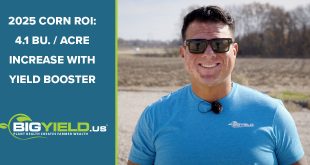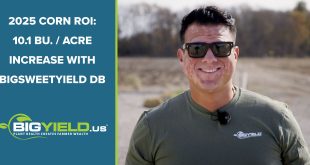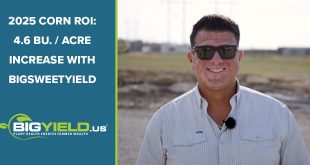
Landon Teal discusses some late season diseases that he has been seeing in the area.
Listen to the BigYield.us team and Kyle Hill, Ag 1280 Farm Director, each Monday, Wednesday, and Friday on Ag 1280 KDKD-AM. The segments air at 7:15 am and again at 12:15 pm.
This segment originally aired on August 4, 2017.
Audio Transcript
Kyle: Time for another BigYield Spotlight. I’m Kyle Hill, visiting with Landon Teal of BigYield.us. Good to be visiting with you again Landon.
Landon: Thank you Kyle.
Kyle: We’re reaching some of the final reproductive stages in corn. What are some things that growers should continue to look out for?
Landon: There’s a couple different things that I like to inform our growers about as we near the end of the season. One is weed escapes. This can be huge in helping plan for next seasons weed management practices. The biggest thing I like to let our guys know about is the late season diseases that I am starting to see, whether in their fields or the fields around the area.
Kyle: What kind of late season diseases are you looking for out there?
Landon: Well, one of the things I look for is ear rots and stalk rots. These are the two that make the biggest differences, especially when we are talking about the late season, because we’re getting so close to maturity. Usually when I start to see the ear rots, I see diplodia ear rot, fusarium ear rot, and gibberella ear rot. For stalk rots, the common ones that I am starting to see are diplodia stalk rot, gibberella stalk rot, and fusarium stalk rot.
Kyle: These late season diseases are taking place so close to full maturity, so of course that has to be a problem.
Landon: Yeah, that’s the biggest thing with these late season diseases. A lot of times these diseases have infected the plant at a very early stage or in the vegetative stages, but never showed up until later in the crop cycle. That’s why we are seeing them late in the season or after we have gotten close to maturity. With the ear rots, that can really damage the kernels and decrease overall yield. With stalk rots, this gets hard because 90% of the time, the plant will end up falling over or laying on the ground, and from that point the ear will stop developing and this gets hard for growers to pick ears of the ground with a combine – especially if the ear has already matured and is sitting there on the ground.
Kyle: What are some management practices that growers can take to reduce the chance of late season disease affecting their crop?
Landon: You’re right, it all comes down to management. With late season diseases, there is really no cure in this particular point in the growing season. When you go out and see these, you just have to watch it do its thing because there is no cure for it. Finding them will help you manage for next seasons crop. A lot of these diseases reside in corn residue, so crop rotation will help reduce pressure. From there, growers can select varieties with late season disease resistance, they can fertilize according to soil tests, and improve soil conditions as far as compaction or other stresses. Also using beneficial biologicals will also help fight disease at time of infection.
Kyle: Now last time we talked about your BigBioYield, how that is beneficial for soybean plants. How can this biological benefit corn crops?
Landon: With our BigBioYield, it is our product with multiple beneficial bacteria, derived from naturally occurring microorganisms that are proven to increase plant health and crop yields. Using naturally occurring microorganisms helps fight and combat diseases that not only were not always in the soil, but we are putting more into the soils. We’re going to have more beneficial growth and we will have disease growth.
Kyle: For anybody that has questions about BigBioYield, or any of the other products you have available with BigYield, how can they get ahold of you Landon?
Landon: They can contact us online at www.BigYield.us, give us a call at 816-773-6096, or stop by the research farm there in Garden City.
Kyle: Landon Teal, an agronomist with BigYield.us. Good to be visiting with you again and getting an update on what’s going on out there in the field.
Landon: Thanks Kyle.
 BigYield High Yield Soybeans, High Yield Corn, and High Yield Wheat
BigYield High Yield Soybeans, High Yield Corn, and High Yield Wheat



